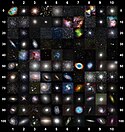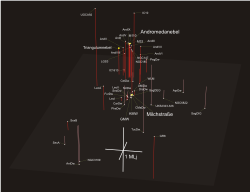M31 - chandra - 2006
Autor/Urheber:
Credit: NASA/CXC/SAO/R.Barnard, Z.Lee et al.
Shortlink:
Quelle:
Größe:
2048 x 2048 Pixel (476080 Bytes)
Beschreibung:
X-ray Images of M31's Core
Twenty-six black hole candidates - the largest number found in a galaxy outside our own - have been discovered in the Milky Way's galactic neighbor, Andromeda. Using over 150 Chandra observations spread over 13 years, researchers identified the bonanza of stellar-mass black holes, that is, those that form from the collapse of a giant star and typically have masses between five and ten times that of the Sun. These images show the Chandra view of the central region of Andromeda, also known as M31. It is expected that billions of years in the future, the Milky Way and Andromeda will collide and many more black holes will be created.
Kommentar zur Lizenz:
| Diese Datei ist gemeinfrei (public domain), da sie von der NASA erstellt worden ist. Die NASA-Urheberrechtsrichtlinie besagt, dass „NASA-Material nicht durch Urheberrecht geschützt ist, wenn es nicht anders angegeben ist“. (NASA-Urheberrechtsrichtlinie-Seite oder JPL Image Use Policy). |  | |
 |
Warnung:
|
Lizenz:
Public domain
Credit:
https://chandra.harvard.edu/photo/2013/m31/more.html (cropped), inset of File:M31_before.tif, File:M31_after.tif
Relevante Bilder
Relevante Artikel
AndromedagalaxieDie Andromedagalaxie, auch (veraltet) Andromedanebel oder Großer Andromedanebel genannt, ist mit rund 2,5 Millionen Lichtjahren Entfernung die am nächsten zur Milchstraße gelegene Spiralgalaxie. Sie ist zugleich das entfernteste Objekt, das unter guten Bedingungen ohne technische Hilfsmittel mit bloßem Auge beobachtet werden kann. Sie liegt im Sternbild Andromeda, von dem auch ihr Name stammt. Häufig wird sie auch kurz als M31 bezeichnet nach ihrem Eintrag im Messier-Katalog. .. weiterlesen




















